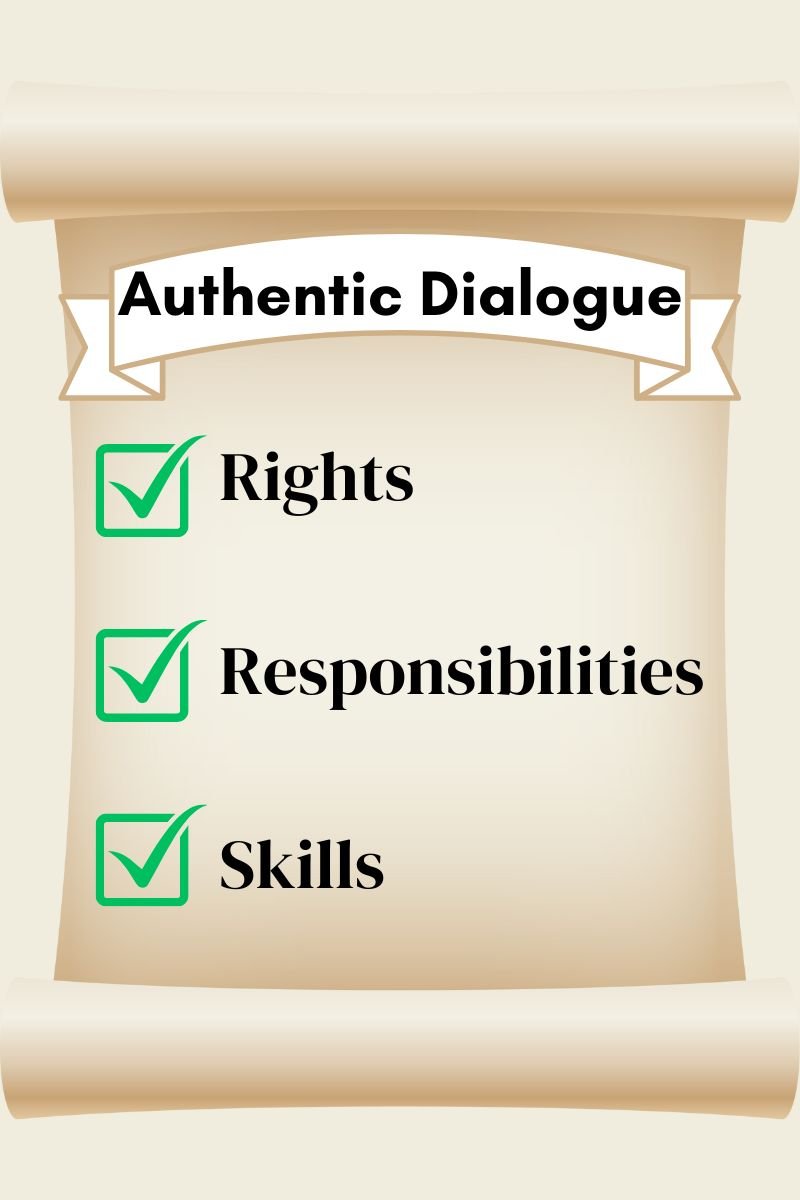Nurturing Authentic Dialogue: Rights, Responsibilities, and Essential Skills
You may be interested in reading this article where Sundiata introduces Authentic Dialogue:
Understanding Authentic Dialogue: What It Is and Why It Matters
Welcome back to the second post in our series, “Conversations That Connect: Navigating the Path from Debate to Authentic Dialogue,” where we are talking about the art and science of Authentic Dialogue.
Building on our exploration of the transition from competition-based communication to collaborative conversations, this post highlights the framework necessary for true dialogue to flourish. Authentic Dialogue thrives in an environment where mutual respect and trust are paramount, supported by clearly defined rights, responsibilities, and a commitment to developing the key skills. Let’s unpack these elements to understand how they create a protective and productive space for dialogue.
The Importance of Rights in Authentic Dialogue
Rights in the context of Authentic Dialogue serve as safeguards, ensuring every participant feels valued and heard. These rights underscore the fundamental values of respect for the human person. By acknowledging and upholding each individual’s rights, we lay the groundwork for a dialogue that transcends mere exchange of words to become a transformative experience. The rights to self-define, express beliefs freely, ask questions, choose not to change, and expect confidentiality create a space where participants can be vulnerable and honest, key components of genuine understanding.
Responsibilities: The Pillars of Trust
While rights protect individuals, responsibilities bind us to a collective ethic of respect and empathy. They remind us that dialogue is a two-way street, where the respect we deserve is also what we extend to others. Responsibilities in dialogue are rooted in trust in the process itself - a belief that through this mutual exchange, something greater than the sum of individual contributions can emerge. By seriously questioning our assumptions, respecting others’ rights to self-expression, and holding conversations in confidence, we honor the sanctity of the dialogue space. This mutual commitment fosters an atmosphere where participants feel equally valued and safe to share their perspectives.
Navigating Dialogue with Grace by Practicing the Skills
Skills in Authentic Dialogue are the tools we use to navigate the complexities of human interaction. They enable us to engage fully and effectively, embodying the rights and responsibilities we’ve acknowledged. Skills such as articulating our own positions with clarity, setting aside our judgments to truly listen, responding in ways that foster understanding, and maintaining integrity among differing views are crucial. These skills are not innate; they require intentionality and practice. However, their payoff is immense, enabling us to deal with others from a position of mutual trust and respect, based on an honest and sincere approach to dialogue.
Why It All Matters
The rights, responsibilities, and skills associated with Authentic Dialogue are more than just formalities; they are the essence of creating a space where meaningful conversations can flourish. They encourage us to show up not just as speakers and defenders, but as listeners, learners, and collaborators. In a world where communication often devolves into competing monologues, Authentic Dialogue offers a beacon of hope for deeper connection and understanding.
Rights ensure that every voice is valued, responsibilities bind us to a shared commitment to respect and empathy, and skills empower us to engage profoundly and meaningfully. Together, they form the triad that supports Authentic Dialogue, making it a powerful tool for personal growth, relationship building, and societal progress.
As we continue to explore the facets of Authentic Dialogue in this series, understanding the critical role of rights, responsibilities, and skills sets the stage for more enriching interactions. These principles not only guide us in how to engage in dialogue, but also why we do it - to build bridges of understanding that can withstand the weight of our differences. In our upcoming posts, we’ll examine how to cultivate these skills and embody the responsibilities that make Authentic Dialogue not just an ideal to aspire to but a reality we can live in every conversation we have.
Click here to find the handy document where the rights, responsibilities, and skills are outlined.

